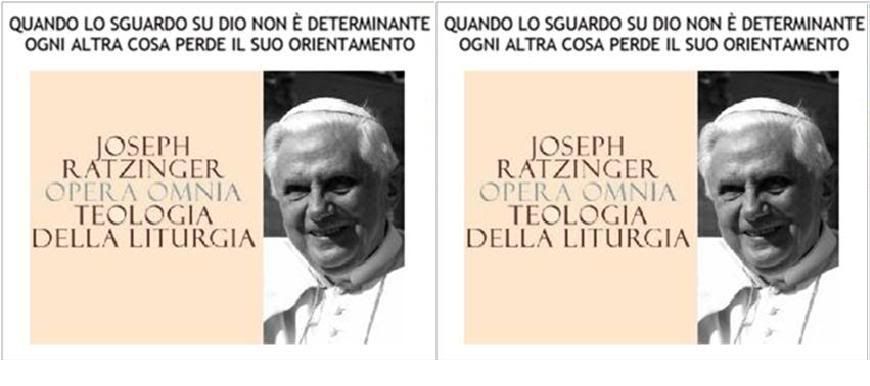
 Joseph Ratzinger's 'Complete Works'
Joseph Ratzinger's 'Complete Works'
introduced in Padua as part of
preparations for Pope's visit
to northeast Italy in May
by Silvia Guidi
Translated from the 2/17/11 issue of

 Sorry, The original PDF online for the flier is fuzzy.
Sorry, The original PDF online for the flier is fuzzy.
Joseph Ratzinger's
Opera Omnia was presented at the Theological Faculty of the Triveneto
[the area of northeast Italy that covers the regions of Veneto, Trentino-Alto Adige/Südtirol, and Friuli-Venezia Giulia] on Thursday, Feb. 17, by Mon. Gerhard Mueller, Bishop of Regensburg, and president of the Institut Benedikt XVI which undertook the project.
Mons. Mueller delivered a lectio magistralis on the
Theology of Liturgy: The sacramental foundation of Christian existence, the first volume translated into Italian of the collected works of Joseph Ratzinger (everything he wrote before he became Pope), which come to 16 volumes (Five volumes have already been published in GErman.)
The event was part of the region's preparation for the Pope's visit to Aquileia and Venice on May 8-9. (Padua is part of the Patriarchate of Venice).
Fr. Andrea Toniolo, president of the Theological Faculty opened the proceedings after a greeting from Mons. Antonio Mattiazzo, Bishop of Padua.
Also speaking at the presentation was Fr. Luigi Girardi, president of the Santa Giustina Institute of Pastoral Liturgy in Padua, with the lecture, "Joseph Ratzinger: A theologian confronts liturgy".
"In the long history of Pope Benedict XVI's predecessors," wrote Mons. Mueller, "one can compare him to the eminently erudite 18th century Pope Benedict XIV (1740-1758) but also to Pope Leo the Great (440-461), who formulated the decisive Christological confession of the Council of Chalcedon (451).
Here are parts of Bishop Mueller's presentation:
For more than 50 years, the name of Joseph Ratzinger has been associated with an original view of systematic theology in its entirety. His writings represent a union of scientific knowledge in theology to the living faith experienced by the writer.
Complex topics are not subjected to complicated reflection that render them incomprehensible to common understanding but he makes them transparent by the intimate linearity of his presentation.
Regensburg, of course, has a special place in the personal story of the theology professor who was destined to follow John Paul II as Pope.
In his academic career, Joseph Ratzinger has taught in the Institute of Superior Studies in Freising and the universities of Bonn, Muenster, Tuebingen and, finally, Regensburg, where he taught from 1969 until he was named Archishop of Munich-Freising in 1977.
After that, then Cardinal Ratzinger remained closely tied to the city and diocese of Regensburg during the long period when he was prefect of the Congregation for the Doctrine of the Faith (1982-2005). He regularly came back to visit his brother Georg.
His homilies at the Cathedral of Regensburg on various liturgical feasts were unforgettable. His parents Joseph and Maria Ratzinger, and his sister Maria, are buried in the cemetery of Ziegetsdorf in Regensburg diocese.
"After so many years moving from place to place and changing assignments, we were once more at home", he wrote at the time he built a house in Pentling, at the outskirts of Regensburg.
During the Pope's apostolic visit to his native Bavaria in 2006, Benedict XVI underscored once more the intimate link between faith and reason in the now world-famous 'Regensburg lecture' - the fact that neither faith nor reason are able to achieve their respective goals independent of each other. Correcting and purifying each other, reason and faith save themselves from dangerous pathologies.
In this sense, Pope Benedict follows the great tradition of the theological sciences, which, in the global structure of a university, function as a connective element.
In this way, Regensburg became the 'genius loci' [tutelary deity] which has undertaken to assemble and take custody of his complete theological works.
Regensburg is a city which, with its eminent history of erudite bishops like Albert the Great (1260-1262) and Johann Michael Sailer (1821-1832), confirms the rationality of faith and the pastoral fruitfulness of knowledge.
It is a tradition that was carried forward by Archbishop Michael Buchberger (bishop from 1927-1961) under whose direction the Lexikon für Theologie und Kirche took shape.

[Modificato da TERESA BENEDETTA 18/02/2011 12:36]